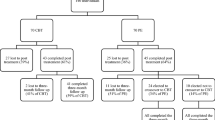Abstract
Background
Although self-management is important for Crohn’s disease (CD), there is no research focusing on self-management, especially in worsening conditions. The purpose of this study was to investigate how quiescent CD patients cope with their conditions worsening.
Methods
A questionnaire containing six types of coping strategy for worsening conditions was created based on a semi-structured interview. Seventy-six quiescent CD patients participated in this study. We also analyzed the related factors of each coping strategy for worsening conditions.
Results
The total percentage of subjects who adopt the strategy of “change contents of meals” ‘always’ or ‘often’ was approximately 70%. On the other hand, the strategy of “see a doctor immediately” was approximately 20% in total of ‘always’ or ‘often’. When ‘sometimes’ was added, “take extra medicine” was approximately 42%. The subjects with experience of hospitalization within 3 years (Z = −2.352, P = 0.019), presence of supplemental elemental diet (Z = −5.182, P < 0.001), or 1 year or less interval since last relapse (Z = −3.352, P = 0.001) showed a significant tendency to adopt the coping strategy of “take (add to) elemental diet.”
Conclusion
The major coping strategy was “change contents of meals,” and the minor coping strategy was “see a doctor immediately.” The subjects with unstable disease state adopted the coping strategy of “take (add to) elemental diet.” The coping strategies for worsening conditions vary according to patients’ backgrounds. The coping type should be taken into account when treating CD patients.
Similar content being viewed by others
References
Mitchell A, Guyatt G, Singer J, Irvine EJ, Goodacre R, Tompkins C, et al. Quality of life in patients with inflammatory bowel disease. J Clin Gastroenterol. 1988;10:306–10.
Drossman DA, Patrick DL, Mitchell CM, Zagami EA, Appelbaum MI. Health-related quality of life in inflammatory bowel disease. Functional status and patient worries and concerns. Dig Dis Sci. 1989;34:1379–86.
Joachim G, Milne B. Inflammatory bowel disease: effects on lifestyle. J Adv Nurs. 1987;12:483–7.
Levenstein S, Li Z, Almer S, Barbosa A, Marquis P, Moser G, et al. Cross-cultural variation in disease-related concerns among patients with inflammatory bowel disease. Am J Gastroenterol. 2001;96:1822–30.
Mussell M, Bocker U, Nagel N, Singer MV. Predictors of disease-related concerns and other aspects of health-related quality of life in outpatients with inflammatory bowel disease. Eur J Gastroenterol Hepatol. 2004;16:1273–80.
Irvine EJ. Review article: patients’ fears and unmet needs in inflammatory bowel disease. Aliment Pharmacol Ther. 2004;20(Suppl 4):54–9.
Kennedy AP, Rogers AE. Improving patient involvement in chronic disease management: the views of patients, GPs and specialists on a guidebook for ulcerative colitis. Patient Educ Couns. 2002;47:257–63.
Hashimoto H, Iwao Y, Hibi T, Ueno F, Miyahara T, Sugita A, et al. A model of quality of life in the patients with Crohn’s disease (in Japanese with English abstract). Nippon Shokakibyo Gakkai Zasshi (JJSG). 1999;96:1258–65.
Best WR, Becktel JM, Singleton JW, Kern F Jr. Development of a Crohn’s disease activity index. National Cooperative Crohn’s Disease Study. Gastroenterology. 1976;70:439–44.
Shoda R, Matsueda K, Yamato S, Umeda N. Epidemiologic analysis of Crohn disease in Japan: increased dietary intake of n-6 polyunsaturated fatty acids and animal protein relates to the increased incidence of Crohn disease in Japan. Am J Clin Nutr. 1996;63:741–5.
Zachos M, Tondeur M, Griffiths AM. Enteral nutritional therapy for induction of remission in Crohn’s disease. Cochrane Database Syst Rev. 2009;1.
Griffiths AM, Ohlsson A, Sherman PM, Sutherland LR. Meta-analysis of enteral nutrition as a primary treatment of active Crohn’s disease. Gastroenterology. 1995;108:1056–67.
Tanaka M, Iwao Y, Sasaki S, Okamoto S, Ogata H, Hibi T, et al. Moderate dietary temperance effectively prevents relapse of Crohn Disease: a prospective study of patients in remission. Gastroenterol Nurs. 2007;30:202–10.
Bernal I, Domenech E, Garcia-Planella E, Marin L, Manosa M, Navarro M, et al. Medication-taking behavior in a cohort of patients with inflammatory bowel disease. Dig Dis Sci. 2006;51:2165–9.
Robinson A, Thompson DG, Wilkin D, Roberts C, Northwest Gastrointestinal Research. Guided self-management and patient-directed follow-up of ulcerative colitis: a randomised trial. Lancet. 2001;358:976–81.
Travis SPL, Stange EF, Lemann M, Oresland T, Chowers Y, Forbes A, et al. European evidence based consensus on the diagnosis and management of Crohn’s disease: current management. Gut. 2006;55(Suppl 1):i16–35.
Acknowledgments
We are grateful to the patients who agreed to participate. The authors also would like to thank the staff members of the outpatient clinic of Yokohama City Hospital and Social Insurance Central General Hospital. This work was supported by grants from The YAMAJI Nursing Research Foundation, Tokyo, Japan.
Author information
Authors and Affiliations
Corresponding author
Rights and permissions
About this article
Cite this article
Tanaka, M., Iwao, Y., Okamoto, S. et al. Coping strategy when patients with quiescent Crohn’s disease recognize that their conditions are worsening. J Gastroenterol 44, 1109–1112 (2009). https://doi.org/10.1007/s00535-009-0104-0
Received:
Accepted:
Published:
Issue Date:
DOI: https://doi.org/10.1007/s00535-009-0104-0




